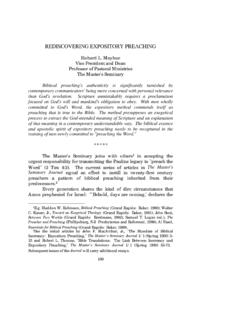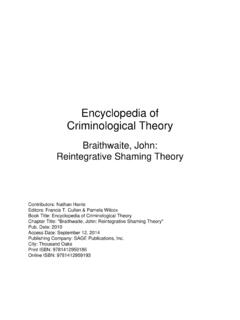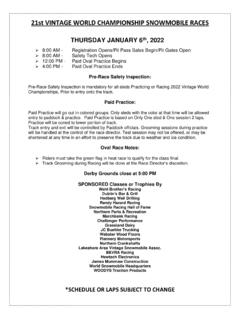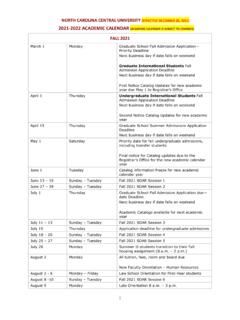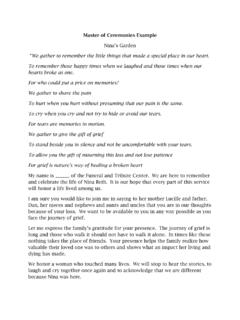Transcription of The Master’s Seminary JOURNAL
1 The master s Seminary JournalVolume 32 Number 2 Fall 2021 The master s SeminaryJOURNALPUBLISHED SEMI-ANNUALLYVOLUME 32 NUMBER 2 Fall 2021 THE master S SEMINARY13248 Roscoe Boulevard, Los Angeles, California91352 THE master S Seminary JOURNAL13248 Roscoe BoulevardLos Angeles, California PostagePAIDVan Nuys, CAPermit No. 99 THE master S Seminary JOURNAL published by THE master S Seminary Abner Chou, Interim President Nathan A. Busenitz, Dean of Faculty Edited for the Faculty: Lucas Alem n Carl Hargrove Bryan J. Murphy Brian Biedebach Brad Klassen Roberto S nchez Nathan A. Busenitz Steven J. Lawson Paul Twiss Austin Duncan John MacArthur Iosif J. Zhakevich Josiah Grauman James R. Mook Mark Zhakevich Michael A.
2 Grisanti Kevin D. Zuber by Peter Sammons Managing Editor Kevin D. Zuber Production Supervisor Jack Gamble-Smith Editor Anastasia Prinzing Layout Designer The views represented herein are not necessarily endorsed by The master s Seminary , its administration, or its faculty. The master s Seminary JOURNAL (TMSJ) is published semiannually and distributed electronically. For information about articles, policy, or JOURNAL access, contact TMSJ is indexed in Elenchus Bibliographicus Biblicus of Biblica; Christian Periodical Index; and Guide to Social Science & Religion in Periodical Literature. Articles are abstracted in New Testament Abstracts; Old Testament Abstracts; and Religious and Theological Abstracts.
3 This periodical is indexed in the ATLA Religion Database , (ATLAS ) collection. Both are products of the American Theological Library Association. Copyright is waived if articles are used in a classroom or congregation and if the number of copies (to be distributed free of charge and marked, Copyright (year). Reprinted from The master s Seminary JOURNAL . ) does not exceed one hundred. For any other use, advance permission is required. ISSN #1066-3959 Volume 32 Fall 2021 Number 2 THE master S Seminary JOURNAL CONTENTS Editorial .. 181 John MacArthur You Must Be Born Again .. 185 John MacArthur Sovereign Regeneration: Effectual Grace in the New Birth .. 199 Steven J. Lawson A Reformed Scholastic Look at Regeneration.
4 219 Mark Jones John Owen on Regeneration .. 239 Whitney Gamble-Smith Monergism .. 253 Nicholas Needham Chosen, Born Again, and Believing: How Election, Regeneration, and Faith Relate to Each Other in the Gospel According to John .. 269 Andrew David Naselli The Transforming Power of Puritan Doctrinal Preaching: The Westminster Directory and Its Application for Today .. 287 Joel R. Beeke Reviews .. 301 Basics of Hebrew Accents by Mark D. Futato, Sr.. 301 Reviewed by Paul Twiss Daniel: Evangelical Exegetical Commentary by J. Paul Tanner .. 303 Reviewed by Iosif J. Zhakevich Tethered to the Cross: The Life and Preaching of C. H. Spurgeon by Thomas Breimaier .. 304 Reviewed by Kevin D. Zuber Volume 32 Fall 2021 Number 2 Fault Lines: The Social Justice Movement and Evangelicalism s Looming Catastrophe by Voddie Baucham.
5 306 Reviewed by Virgil Walker The Attributes of God: An Introduction by Gerald Bray .. 308 Reviewed by James R. Mook The Case for Biblical Archaeology: Uncovering the Historical Record of God s Old Testament People by John D. Currid .. 313 Reviewed by Michael A. Grisanti 181 TMSJ 32/2 (Fall 2021) 181 183 EDITORIAL Dr. John MacArthur Chancellor of The master s University and Seminary Pastor of Grace Community Church * * * * * When Jesus told Nicodemus, You must be born again (John 3:7), he was not giving the Pharisee a task to perform. Nor did Nicodemus take it that way. As a well-educated rabbi ( a ruler of the Jews v. 1) he was thoroughly conversant with figurative language. He didn t think that Jesus was telling him he literally needed to enter a second time into his mother's womb and be born (v.)
6 4). The first and last of Nicodemus's questions ( How can a man be born when he is old? and How can these things be? vv. 4, 9) signified that he correctly understood Jesus point namely, that by definition it is impossible for anyone to give birth to himself. Jesus reply to Nicodemus s amazement emphatically confirmed the point: That which is born of the Spirit is spirit (v. 6). The New Birth (regeneration) is the Holy Spirit s work, and we cannot observe, govern, or direct the Spirit of God any more than we can see and control the wind. Jesus was prompting this works-oriented religious leader to understand that he needed a divine Savior, because the salvation of a sinner, from start to finish, is a work only God can do.
7 The point is even more obvious in the original language. The Greek word translated again in most English versions of John 3:7 is anoth n literally, from above. That s precisely how the word is translated in John 3:31 ( He who comes from above is above all ) and 19:11 ( You would have no authority over Me, unless it had been given you from above ). Jesus was telling Nicodemus in the plainest possible way that he must be born from above, by the Holy Spirit s agency born anew. Again, this was obviously not a work he could do; he needed the Spirit to give him new life and a new start. Rather than imagining he could gain divine approval by his own efforts, he had to confess his need, seek God s grace, and ask for the Spirit to work on his behalf.
8 It is the Spirit who gives life; the flesh profits nothing (John 6:63). Nicodemus had greeted Jesus with what amounted to a profession of faith: We know that You have come from God as a teacher; for no one can do these signs that You do unless God is with him (v. 2). He probably hoped to receive congratulations and a blessing from Jesus. Instead, he got this brusque-sounding, authoritative182 | Editorial message, basically informing him that he had zero hope of earning a place in the kingdom for himself. Unless one is born again he cannot see the kingdom of God (John 3:3). Here is the key lesson that runs like a powerful current through everything the Bible says about the New Birth: Eternal life is not a prize for being good.
9 It is not a reward for those who try harder. It is not heaven s reimbursement for those who live sacrificially in this life. It is not a wage that can be earned by being pious and legalistic. You don t obtain it by forsaking vices or praying prayers. You can t acquire it by paying tithes or performing religious ceremonies. It isn t the birthright of anyone s ethnicity or an entitlement for some privileged class. You don t get it by joining a religious sect, no matter how meticulously you keep its traditions. The doctrine of regeneration, properly understood, will stop any legalist dead in his tracks, and that is precisely the effect Jesus words had on Nicodemus. His life and religion had been totally devoted to the notion that he could achieve heaven by his own righteousness and with one sentence, Jesus (whose divine authority Nicodemus had already correctly confessed) demolished the Pharisees whole belief system.
10 By the rules governing evangelical discourse today, to be that abrupt with an inquiring non-Christian (especially a respected religious leader) would draw a penalty flag. Even in Jesus time, a casual observer might think the Lord was being curt and tactless. After all, Nicodemus was a member of the ruling council (the Sanhedrin). As such, he was deemed worthy of great respect. He was not approaching Jesus antagonistically. On the contrary, he had begun the conversation in the friendliest way possible, with a salutation and testimonial formally recognizing the authority of Christ s words and the authenticity of his works. But Jesus did not even acknowledge the honor, much less offer any reciprocal compliment.

